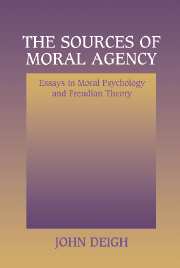Book contents
- Frontmatter
- Contents
- Preface
- Sources
- Abbreviations
- Dedication
- 1 Morality and personal relations
- 2 On the right to be punished: Some doubts
- 3 Love, guilt, and the sense of justice
- 4 Remarks on some difficulties in Freud's theory of moral development
- 5 Freud's later theory of civilization: Changes and implications
- 6 Freud, naturalism, and modern moral philosophy
- 7 Reason and motivation
- 8 Empathy and universalizability
- 9 Sidgwick on ethical judgment
- 10 Reason and ethics in Hobbes's Leviathan
- 11 Shame and self-esteem: A critique
- Index
6 - Freud, naturalism, and modern moral philosophy
Published online by Cambridge University Press: 04 December 2009
- Frontmatter
- Contents
- Preface
- Sources
- Abbreviations
- Dedication
- 1 Morality and personal relations
- 2 On the right to be punished: Some doubts
- 3 Love, guilt, and the sense of justice
- 4 Remarks on some difficulties in Freud's theory of moral development
- 5 Freud's later theory of civilization: Changes and implications
- 6 Freud, naturalism, and modern moral philosophy
- 7 Reason and motivation
- 8 Empathy and universalizability
- 9 Sidgwick on ethical judgment
- 10 Reason and ethics in Hobbes's Leviathan
- 11 Shame and self-esteem: A critique
- Index
Summary
“The moral law,” Kant wrote in his most searching analysis of morality and its origin in practical reason, “ … [provides] a fact absolutely inexplicable from any data of the world of sense or from the whole compass of the theoretical use of reason, and this fact points to a pure intelligible world.” The fact to which Kant here refers is the fact of motivational force that is inherent in the consciousness of the moral law. On Kant's analysis, its great import lies in the impossibility of tracing this force to the operations of any natural appetite or passion, for this impossibility, Kant held, shows that the force wholly originates in the operations of reason. Accordingly, he dubbed the fact “a fact of reason.”
Reason in this case, because it works to determine the will rather than enlarge the understanding, operates as a practical rather than a theoretical faculty, and because these operations of practical reason are disconnected from those of natural appetite and passion, they occur spontaneously, undetermined by the forces of nature. It follows then, Kant concluded, that when we act morally, that is, when we act from recognition of what the moral law requires and for no other reason, we act freely.
- Type
- Chapter
- Information
- The Sources of Moral AgencyEssays in Moral Psychology and Freudian Theory, pp. 113 - 132Publisher: Cambridge University PressPrint publication year: 1996



